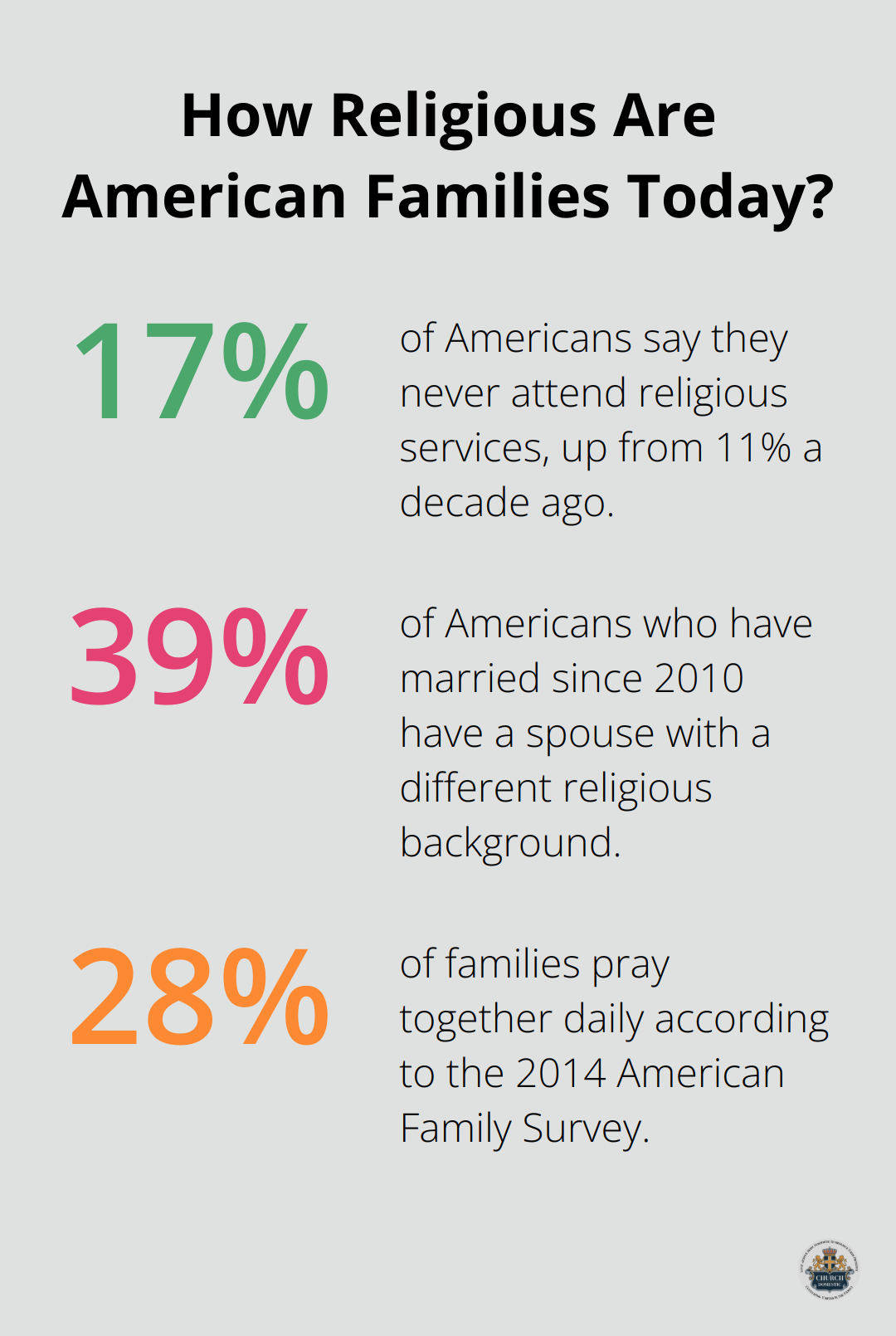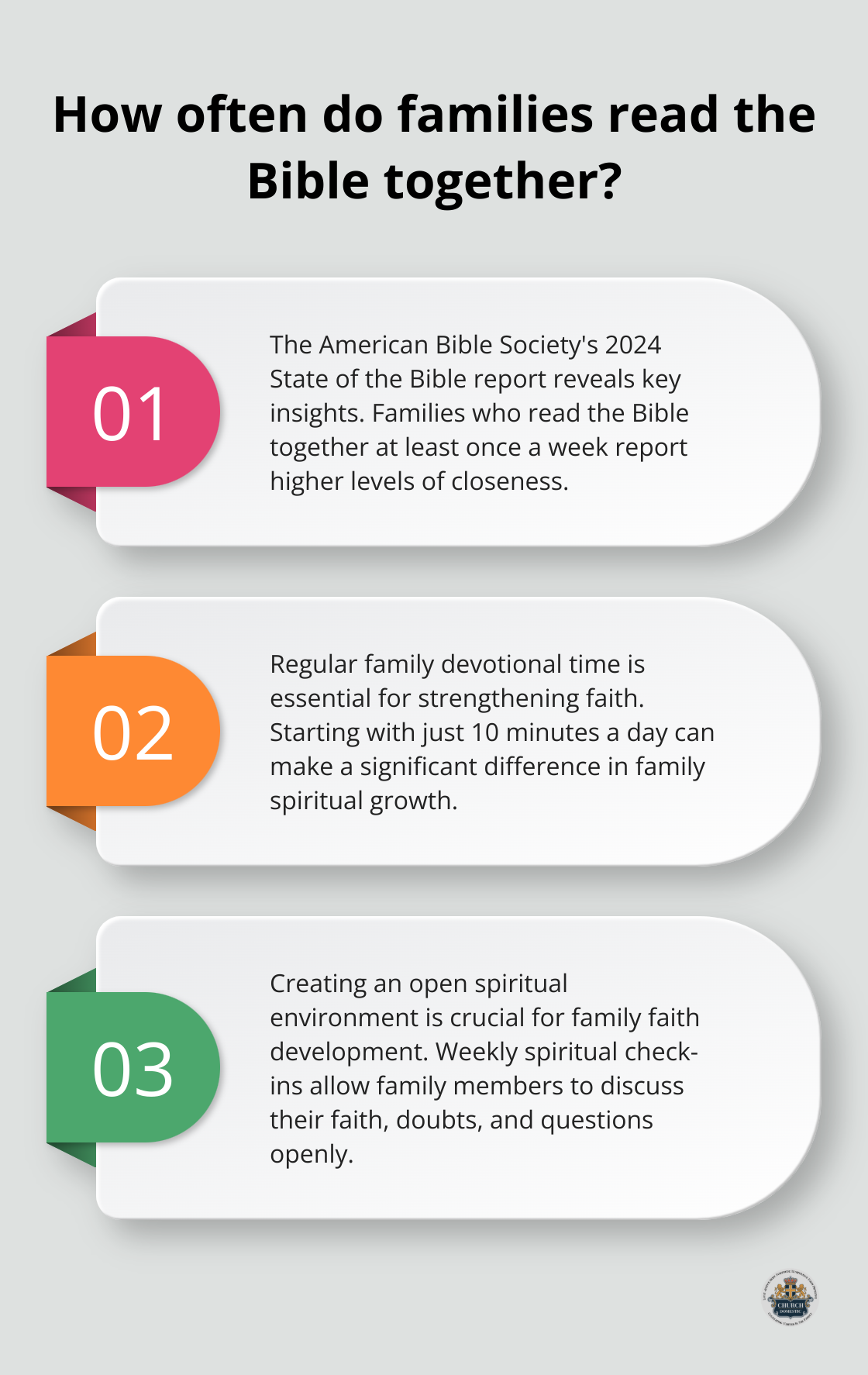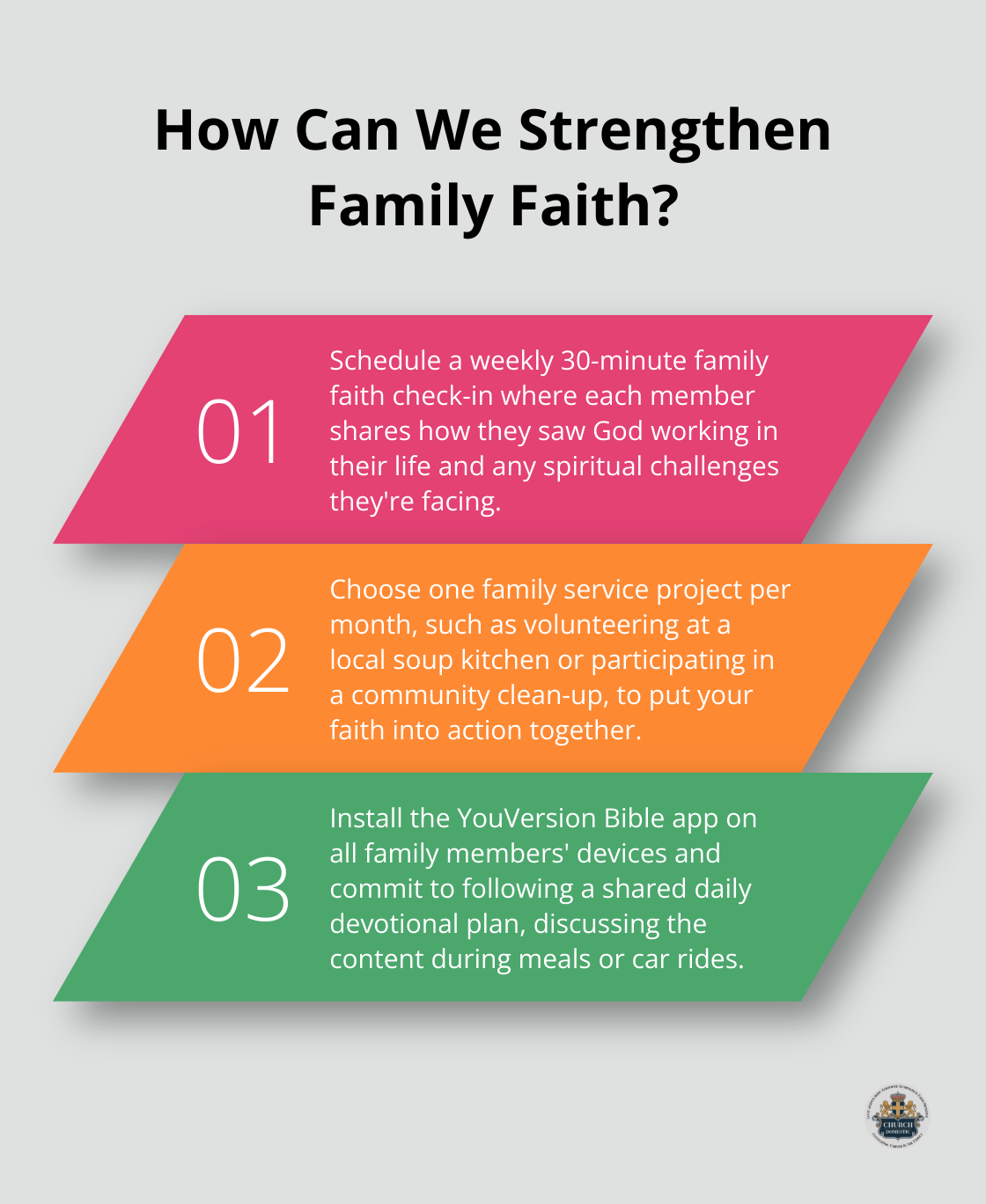Faith challenges can test even the strongest families. At Church Domestic, we understand the importance of navigating these obstacles together.
This blog post explores common spiritual hurdles families face and provides practical strategies to overcome them. We’ll also share valuable resources to support your family’s faith journey.
Faith Challenges Families Face Today
Modern families often struggle to maintain a strong spiritual foundation in our fast-paced world. We at Church Domestic have identified several common faith challenges that families encounter.
The Secular-Spiritual Tug-of-War
One of the biggest hurdles families face is the balance between secular and spiritual commitments. Packed schedules filled with work, school, and extracurricular activities make it difficult to find time for faith. A 2019 study found that 17% of Americans say they never attend religious services, up from 11% a decade ago. This decline in regular attendance often stems from competing time demands.

To address this, families can integrate faith into daily routines. For example, they can say grace before meals or have short devotionals during car rides to maintain spiritual focus without adding extra time commitments.
Navigating Diverse Beliefs
Another challenge arises when family members hold different beliefs. This is increasingly common in today’s diverse society. A 2014 Pew Research survey revealed that 39% of Americans who have married since 2010 have a spouse with a different religious background.
Open communication is key to addressing this challenge. Families should set aside time for respectful discussions about faith, focusing on shared values rather than differences. They should encourage curiosity and understanding, allowing each family member to express their beliefs without judgment.
Doubt and Faith Questions
Doubt is a natural part of faith development, but it can unsettle families. A study revealed that people who encounter more negative interaction with fellow congregants have more doubts about religion, whereas more spiritual support is associated with fewer doubts.
Families should create a safe space for members to express doubts and ask questions. They should encourage exploration of faith through reading, discussions, and seeking guidance from trusted spiritual leaders. Doubt can lead to deeper understanding and stronger faith when addressed openly.
Consistency in Spiritual Practices
Consistent spiritual practices are vital for family faith, but many find it challenging to maintain them. The 2014 American Family Survey found that only 28% of families pray together daily.
To improve consistency, families should establish realistic spiritual routines that fit their lifestyle. This could be a weekly family Bible study, daily prayer time, or monthly service projects. They should start small and gradually build up to more frequent practices as they become habits.
Overcoming Digital Distractions
In our technology-driven world, digital distractions pose a significant challenge to family faith. Social media, streaming services, and endless online content compete for attention that could be directed towards spiritual growth.
Families can combat this by setting “tech-free” times (especially during meals or family devotionals). They can also use technology positively by exploring faith-based apps or online resources together. The key is to be intentional about how technology intersects with family faith practices.
As we move forward, let’s explore strategies for strengthening family faith in the face of these challenges. These practical approaches will help families build a robust spiritual foundation together.
How Families Can Strengthen Their Faith Together
Families who want to build a strong spiritual foundation must go beyond Sunday church attendance. They need to weave faith into their daily lives. Here are practical ways families can strengthen their faith as a unit:
Establish a Family Faith Routine
A regular family devotional time is essential. Start with just 10 minutes a day (it can make a significant difference). Pick a consistent time that suits everyone, such as after dinner or before bed. Use age-appropriate devotionals or read a Bible passage and discuss its meaning. Families who read the Bible together at least once a week report higher levels of closeness, according to the American Bible Society’s 2024 State of the Bible report.
Create an Open Spiritual Environment
Families should cultivate an atmosphere where members feel safe to discuss their faith, doubts, and questions. Set aside weekly time for spiritual check-ins. Ask questions like, “How did you see God working this week?” or “What challenges are you facing in your faith right now?” The goal is honest dialogue, not perfect answers. It’s important to strengthen students’ ability to find answers, resolve doubts, respond with faith, and give reason for the hope within them in whatever challenges they may face.
Engage in Family Service Projects
Families can put their faith into action through service. This strengthens both family bonds and spiritual growth. Look for local volunteer opportunities that align with your family’s interests and values. Options include serving at a soup kitchen, participating in a community clean-up, or visiting elderly neighbors. Serving together reinforces the importance of living out your faith.
Incorporate Faith into Daily Activities
Families should find natural ways to bring faith into everyday conversations and activities. They can discuss how a movie’s themes relate to biblical principles, point out examples of God’s creation during nature walks, or pray together when facing challenges or celebrating victories. These small moments (when added up) create a faith-filled family culture.
Use Technology for Spiritual Growth
While digital distractions can hinder family faith, technology can also be a powerful tool for spiritual growth. Families can explore faith-based apps together, listen to Christian podcasts during car rides, or participate in online Bible studies. The key is to use technology intentionally to enhance, not replace, face-to-face spiritual interactions.

As families implement these strategies, they’ll likely find themselves growing closer to each other and to God. The next section will explore valuable resources and tools that can further support a family’s spiritual growth journey.
Family Faith Resources
Equipping your family with the right tools can make a significant difference in your spiritual journey. We’ve compiled a list of practical resources to help strengthen your family’s faith.
Age-Appropriate Bible Study Materials
The right Bible study materials for each family member are essential. For young children, The Jesus Storybook Bible by Sally Lloyd-Jones presents Bible stories in a way that connects them to Jesus, making it easier for kids to understand the big picture of Scripture.

Teens might prefer The Action Bible, which presents the Bible in a graphic novel format. Adults can benefit from a study Bible like the ESV Study Bible (which provides in-depth commentary and historical context).
Faith-Based Apps and Online Platforms
Technology can serve as a powerful ally in your family’s faith journey. The YouVersion Bible app offers daily devotionals, reading plans, and even has a kids’ version called Bible App for Kids. For family prayer time, the Echo Prayer app allows you to create and share prayer lists, set reminders, and track answered prayers.
RightNow Media offers the world’s largest video-streaming library of biblical resources, including content on marriage, mental health, women’s studies, and kids’ shows.
Christian Counseling and Support Groups
Families sometimes need professional help to navigate faith challenges. The American Association of Christian Counselors (AACC) provides a directory of certified Christian counselors. These professionals offer faith-based guidance for issues ranging from marital problems to faith doubts.
For ongoing support, you can join a small group at your church or a community Bible study like Bible Study Fellowship (BSF). These groups provide regular opportunities for fellowship, accountability, and spiritual growth.
Books and Podcasts on Family Spirituality
A wealth of literature exists on family faith. “The Tech-Wise Family” by Andy Crouch offers practical advice on using technology wisely in a Christian household. For parenting guidance, “Parenting: 14 Gospel Principles That Can Radically Change Your Family” by Paul David Tripp provides valuable insights.
In the podcast realm, “Focus on the Family” provides daily episodes on various family and faith topics. For a deeper exploration of Scripture, “The Bible Project” podcast offers in-depth discussions of biblical themes and books.
Try to find a few resources that resonate with your family’s needs and interests. Start small (perhaps with a family devotional or a shared app), and gradually incorporate more as your family grows in faith together.
Final Thoughts
Faith challenges test families, but the journey strengthens bonds. Families can overcome obstacles by establishing regular devotional times and engaging in community service together. These practices deepen connections with each other and with God, fostering spiritual growth and understanding.

Consistency and open dialogue form the foundation of family faith. Start with daily prayer or weekly Bible study, then build spiritual habits gradually. Create a safe space for each family member to express thoughts and doubts without judgment (this encourages spiritual exploration).
At Church Domestic, we provide resources to help families navigate their spiritual journeys together. Our blog offers practical advice on family life, business, and enjoying life with good friends through a faith-centered lens. Unity and perseverance will help your family emerge stronger and more spiritually grounded than ever before.